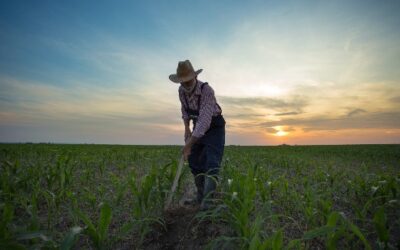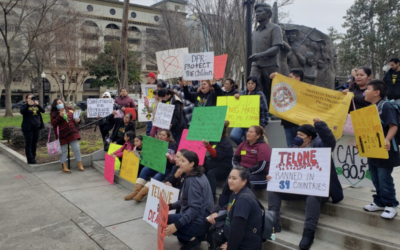As nurses, we know that the repercussions of heat can go way beyond the acute impacts of a week of extreme heat. Record heat year after year has created the conditions for chronic dehydration among outdoor workers. This, in turn, is being associated with a significant increase of chronic kidney disease, a condition that can be fatal if not treated.
Half the state of California never needed air conditioning – until lately – and most still don’t have it. This has meant that many people are left in homes where the indoor temperatures have recently matched the scorching outdoor temperatures. While some community members in the Central Valley can find comfort in the air conditioning that is commonplace in that hotter-than-hot part of CA, some community members don’t really have a choice.
One of the most impacted populations is farmworkers – the good people who plant and tend and harvest our food. They are paid when they work and get nothing when they don’t. Although CA is one of the few states with an occupational heat standard, it is often ignored by workers if the choice is getting paid or not.
The Biden Administration is looking to develop a national heat standard, but will it provide any income security to farmworkers when they seek shade from the 115 degree temperatures in California’s Central Valley? According to The Washington Post, the U.S. Department of Labor Department under which the Occupational Safety and Health Administration falls, “has put a new heat illness rule on a list of agenda items for the Biden administration to consider, calling it a top priority. But Luis Magaña, coordinator of the farmworker advocacy group Organization of Migrant Workers, based in Stockton, notes “It’s a system of the natural environment running against a system of laws that no longer works.”
Come In From the Heat?
Will this new standard prevent farmworkers from workplace discrimination if they chose to exercise their rights under any of the heat rules? Given that a great many farmworkers are undocumented, do we really expect them to be bucking the system? They know that they are one employer’s decision away from deportation. So, no, they are not likely to buck because under our current “system” they have no real rights. And yet…these are the people who feed us.
The Vice President of the US Chamber of Commerce, which represents business interests, was hesitant to support an OSHA Heat Standard questioning the threshold that might be established for the standard to be invoked.
There are other outdoor workers that are in the same situation including landscapers, utility workers, and construction workers. For some of these workers, they have a modicum of protection through the unions they belong to.
Essential Workers’ Right to Live
Magaña says the ask is simple – pay farmworkers a living wage and give them the legal status that they need to access health care and worker protections. “During COVID, they gave the workers documents to show that they are essential to work,” Magaña said. “Why can’t they give documents to show they are essential to live?”
What role can we play, as nurses, to advocate for a fair and equitable health-based standard that will really protect workers when the heat is on.
Barbara Sattler, RN, DrPH, FAAN
Professor Emeritus, University of San Francisco
BOD Member, Alliance of Nurses for Healthy Environments (ANHE)
Leadership Council, CA Nurses for Environmental Health & Justice




